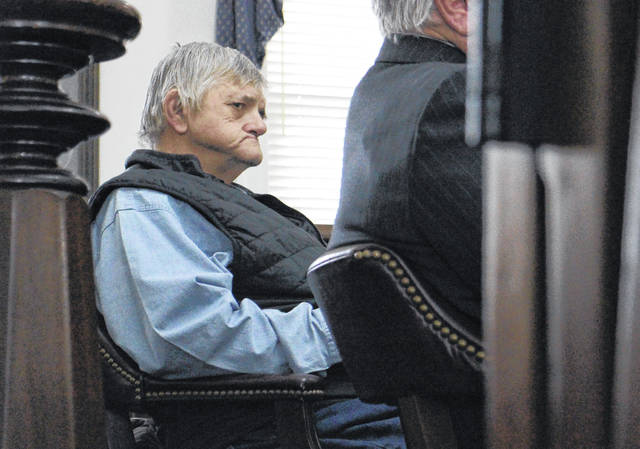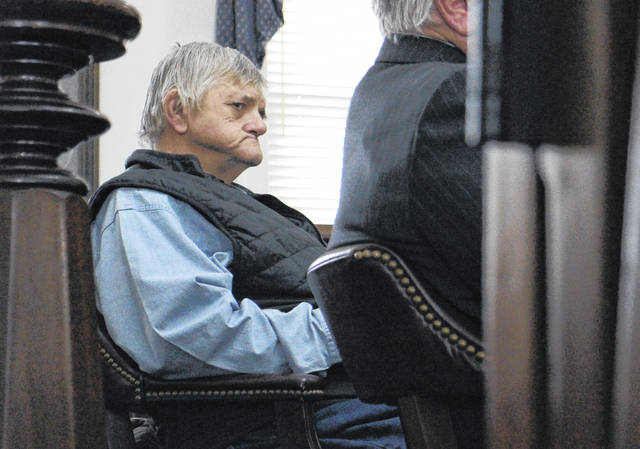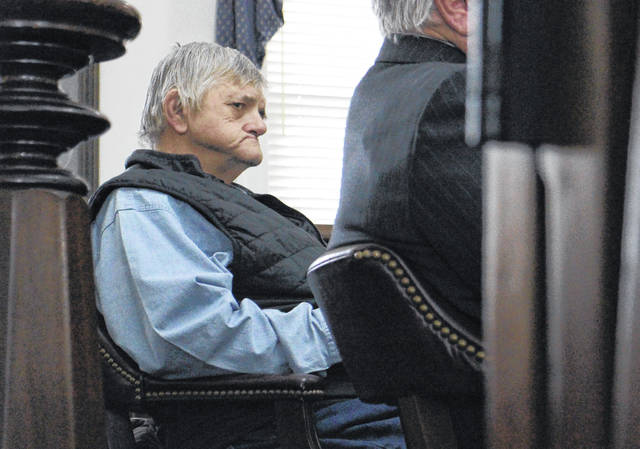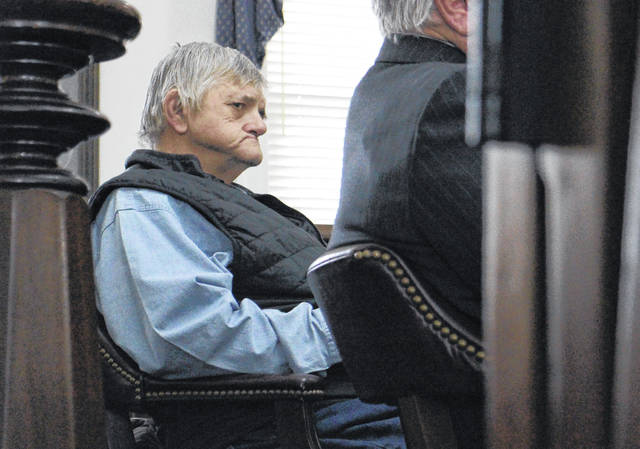



A Highland County jury found a Lynchburg man not guilty of arson charges Tuesday evening after deliberating for several hours at the end of a two-day trial in Highland County Common Pleas Court.
The defendant, Terry Yankie, 64, was accused of setting his Short Road residence on fire in order to collect insurance money. He was charged with aggravated arson, a second-degree felony, and arson, a fourth-degree felony.
After several hours in deliberation, the jury sent out a note at 6:45 p.m. saying the group was deadlocked 10-2. Highland County Common Pleas Court Judge Rocky Coss called them into the courtroom at that point, read instructions on trying to reach a verdict and asked them to go back and continue deliberations, which they did.
The final verdict was handed down a little after 7 p.m.
During the trial, the defense argued that Yankie was attempting to siphon gasoline from a red five-gallon gas can into a white one-gallon receptacle in the kitchen of the home, and accidentally overfilled it, causing gas to spill on the floor of the kitchen, at which time a green flame leapt across the room from a nearby kerosene heater and ignited the gas.
Yankie threw the burning one-gallon can out the door, and in the process, spilled gas across the front patio, the defense argued. Photos of the patio showed what witnesses said were splash marks from the fuel, stretching from the front door of the house out into the yard.
Two fire experts, one testifying for the state and the other for the defense, gave conflicting testimonies as to the veracity of Yankie’s claims.
In testimony for the state, Jim Hunter, an investigator with a fire and explosion investigation firm consulting with the insurance company, said Yankie caused the fire by dumping gasoline in the kitchen, pouring a trail out the door and across the front patio, then lighting it.
Hunter said his firm attempted to replicate the throwing of the one-gallon can to determine whether or not the splash pattern would match up to the one observed on the patio.
According to Hunter, during the test, a man roughly the same size as Yankie threw a one-gallon can filled with water, similar to the one Yankie described, through a makeshift doorway and onto a length of butcher paper at about the same distance as the fire scene.
Hunter said the container was thrown eight times in different ways, and those organizing the test made adjustments to ensure the accuracy of the experiment.
Hunter said the test yielded “nothing even closely resembling” the splash pattern observed on the patio.
During cross examination, Hunter said if he hadn’t conducted the test, he would have ruled the cause of the fire “undetermined,” but would have noted in his report that it was suspicious.
During closing statements, defense attorney Robert Croswell III, representing Yankie, said the test itself didn’t adequately simulate the actual event, and as a result should not have been the deciding factor in Hunter’s investigation.
Hunter said in his testimony that Yankie would have been covered in soot, injured or killed if he had been in the kitchen at the time the gasoline ignited.
Steven Claytor, also a fire investigator, testified for the defense, saying the test conducted by Hunter’s firm “has nothing to do with this case.”
Claytor said during his testimony that a piece of plastic he recovered in the kitchen of the home matched up with a five-gallon gas can similar to the one Yankie claimed he used before the fire started.
Claytor also said if Yankie had poured the gasoline as he walked out of the house, enough fumes would have developed inside the house to cause an explosion when he lit the gas outside.
“Everything is consistent with (Yankie’s) statement,” he said.
In addition, Claytor said he never received evidence from the state that investigators examined the kerosene heater, which Yankie claimed was the cause of the fire.
“No one is examining the ignition source,” Claytor said.
Highland County Prosecuting Attorney Anneka Collins contended in her closing that the kerosene heater was removed by the fire department before state investigators came to the scene, and that officials thoroughly examined the area in accordance with their training.
Collins also said a civil case a number of years ago was thrown out by a judge because Claytor hadn’t investigated the scene properly.
Another area of contention was the color of the flame Yankie claimed he saw in the kitchen.
Hunter testified that kerosene does not burn with a green color. Claytor said in his investigation report that Yankie told him the flame was orange, although he testified at trial that Yankie at one point told him the flame was greenish blue.
Hunter also testified that burn patterns in and around the home indicated the fire had been started on the outside, while Claytor testified the burn patterns indicated the fire began inside.
In closing statements, Croswell compared the state’s witnesses to a person asking whether or not they should amputate a baby’s leg based on limited information, and urged the jury to decide Yankie’s fate using the same judgement.
Collins argued that the jury should use common sense when considering the evidence.
Croswell and Collins declined to comment after the trial.
Reach David Wright at 937-402-2570, or on Twitter @DavidWrighter.


